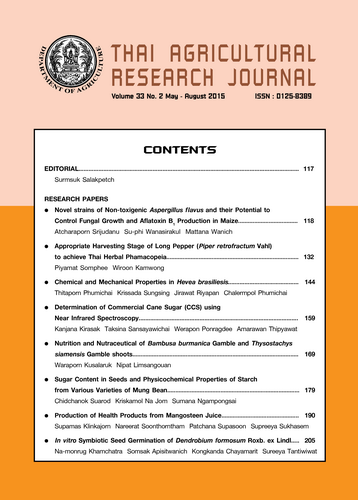Chemical and Mechanical Properties in Hevea brasiliensis
DOI:
https://doi.org/10.14456/thaidoa-agres.2015.7Keywords:
Hevea brasiliensis Muell. Arg., wood properties, wood product, chemical property, mechanical propertiesAbstract
Para wood is economically important for furniture industry in Thailand. The quality of wood depends on the chemical and mechanical properties. This study aims to investigate the influence of genetics to wood properties which can be employed to future breeding program. The rubber samples were selected from small scale clone trial aged thirteen years at Suratthani Agricultural Research and Development Center. The experimental design was completely randomized design including twenty treatments with eight replications. The results showed that the chemical composition and mechanical properties of each wood clone were significantly different. The most suitable clone for using in the wood industry was RRI-CH-35-1403 due mainly to the high alpha cellulose and low solubility in 1% NaOH, indicating to good wood strength and mold resistant. Moreover, RRIM600 clone showed the most proper mechanical for the furniture industry.
Downloads
Published
How to Cite
Issue
Section
License
Copyright (c) 2017 วารสารวิชาการเกษตร (Thai Agricultural Research Journal)

This work is licensed under a Creative Commons Attribution-NonCommercial-NoDerivatives 4.0 International License.
Thai Agricultural Research Journal



